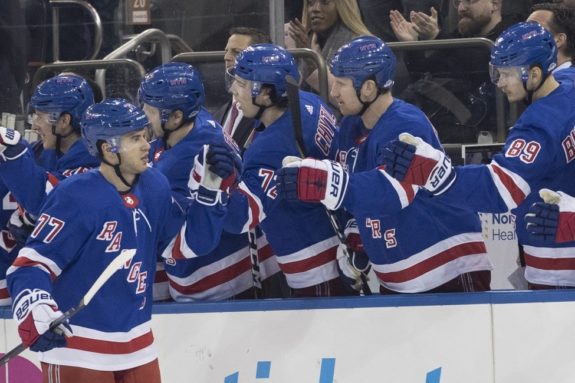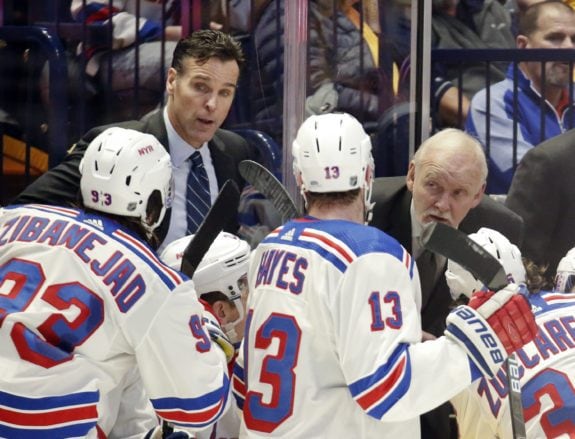New York Rangers defenseman Tony DeAngelo possesses a very valuable on-ice attribute: He plays with a chip on his shoulder. That chip just got a lot heavier, and the Rangers have to hope its bulk motivates him this season rather than weighing him down.
DeAngelo ended his contract holdout Friday by signing a one-year, $925,000 qualifying offer, giving him the salary of a player on an entry-level contract. The Rangers refused to budge off their offer and the defenseman caved to the pressure of needing to get into training camp, abandoning his hopes of inking a more lucrative bridge deal or even a longer-term pact.

The 23-year-old appeared to take a major step forward last season, recording 30 points and excelling on the power play while exhibiting the skating ability and offensive skill that led the Tampa Bay Lightning to make him the 19th pick in the 2014 NHL draft. In addition, his physicality and edge provided a sorely needed addition to a team that was, and remains, a largely finesse-oriented operation.
Yet DeAngelo’s chances of receiving a longer financial commitment this offseason may have always been nonexistent, a fact he seemed to acknowledge with Friday’s agreement. The Rangers’ ugly salary cap situation, along with DeAngelo’s discipline issues that continued to pop up last season, made the timing for a multi-year contract unworkable this time around.
DeAngelo Looks to Show Past Finally Behind Him
That time might come next offseason, when DeAngelo will again be a restricted free agent, this time with arbitration rights. However, earning a bigger money deal will require him to respond forcefully but positively to taking a below-market salary for 2019-20.
“It’s good to have him back,” coach David Quinn said. “He’s a big part of our future. He had a real strong second half last year. Listen, there’s a business side to this, we all understand that, but we’re anticipating him to stay for a while now and we’re glad to have him back.”
Any timeline on DeAngelo getting into practice and then game action remains to be determined, “but we want to get him involved as quickly as possible,” Quinn said.
The coach is exactly right: It’s all business — the sometimes brutally unfair business of the NHL and other major professional sports leagues. Often, that business requires a player to swallow his pride.

For DeAngelo to make that business work better for him, he has to duplicate or improve upon last season’s performance, the best of his three NHL seasons. Just as importantly, he must put the maturity issues that have plagued his promising career in the past for good. Even if the Rangers had ample cap room this offseason, there’s no guarantee they would have offered him a much larger or longer financial commitment given his ongoing issues.
A pair of discipline-related suspensions and multiple in-game benchings in 2018-19 by coach David Quinn drove home the point that DeAngelo had yet to fully put his problems behind him. The Rangers’ cap situation has proven at least somewhat timely for the club — in not being able to offer DeAngelo a bigger contract, they get one more year at low cost to fully evaluate whether he’ll be part of what looks like an exciting near future.
That’s how DeAngelo will need to approach it — fair or not, he’s being asked to prove the problems that gave the Lightning, Arizona Coyotes and now the Rangers some pause are gone for good.
J.T. Miller Case the Perfect Model for DeAngelo
DeAngelo’s jaggedly effective style on the ice stems in part from his edgy personality. That’s who he is, and probably always will be. Whether DeAngelo likes it or not, though, he needs to spend 2019-20 showing the front office that he has found a balance, found the line between edge and destructive behavior that affects his game and his team.
There’s a recent historical lesson from which DeAngelo could take solace: The case of former Rangers forward J.T. Miller, who recorded 10 goals and 13 assists in 58 games in 2014-15 after securing a full-time spot in the lineup, yet was forced to settle for a one-year, $874,000 contract for the 2015-16 season.
Miller, a former first-round pick like DeAngelo, responded with a breakout performance, playing all 82 games and scoring 22 goals with 21 assists. The Rangers liked what they saw and reciprocated, signing Miller to a two-year, $5.5 million contract.
Traded to the Lightning two seasons later, Miller finally found his riches, inking a five-year, $26.25 million extension in June 2018.
As with Miller, the money will eventually be there for DeAngelo — if, like Miller did, he treats his own “prove it” deal as fuel and continues to progress, rather than allowing the situation to consume him. The Rangers are a much better team with him manning the right side in their revamped defense corps, and make no mistake, they also felt pressure to get him signed and into camp.
For DeAngelo, he has a chance to emphatically prove the Rangers wrong. His team would like nothing more than for him to do just that.